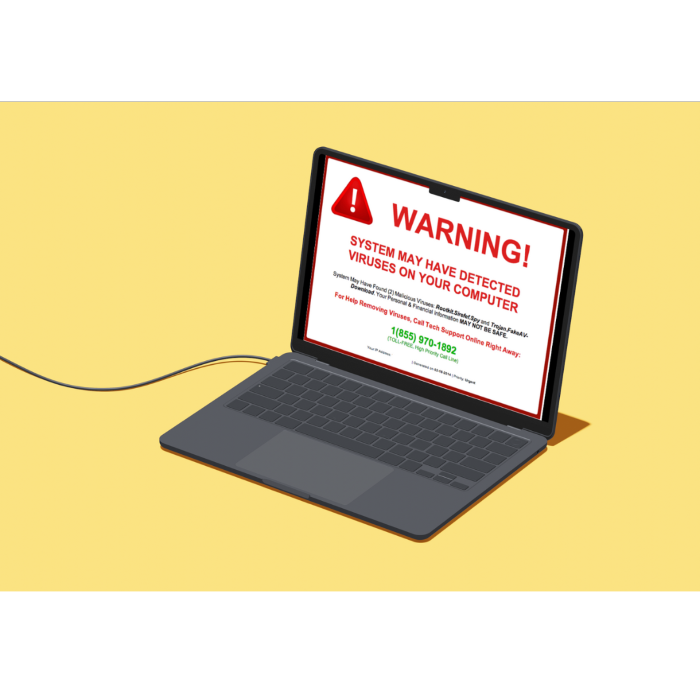What is a Pop-Up Scam?
Pop-up computer scams are a type of cyber-attack where fraudsters impersonate legitimate tech support representatives, often claiming to be from reputable companies like Microsoft or Apple. The victim receives a pop-up message on their computer screen. The pop-up is designed to look official and alarming. It often contains a message stating the computer is infected with a virus, has been compromised or something bad has been detected and will have a phone number for the victim to call. This phone number is controlled by the scammer who will pose as a tech support representative.
How the Pop-Up Scam usually works:
- First Contact: You’re at home, sitting on the couch trying to relax, browsing the internet when suddenly a pop-up ad comes up on your computer screen warning you that your computer has been compromised. You feel yourself start to panic as you notice a phone number in the middle of the pop-up and you reach for your phone to make a phone call to get this figured out. If this has happened to you then you have been hit with a pop-up scam.
- Requests Money: After you call the phone number you will then be connected to a “representative”, who is more than willing to help you. The rep will tell you that something terrible has been detected on our computer, and that you need to act FAST. You will be provided with the amount of money you will need to send to solve this problem and a short time frame to get the cash/crypto/transfer to the fraudster. By giving a time frame the scammer is trying to push a sense of urgency and cloud your judgement.
- Obtaining the Funds: Next the fraudster will provide you with how to get the money to them to get the issue resolved quickly. There are a few different ways they may request the money. The scammer will ask you to send money in a way that would be untraceable and just about impossible to get the funds back such as cash, logging into your online banking or cryptocurrency. They may also try to use resources such as finding the city you are in, to give you more specific instructions on sending the money. For example, First Federal recently had a customer who called the number on the fake computer pop-up and the scammer instructed them to get cash at the bank and bring the funds to a cryptocurrency ATM that was in McMinnville.
How to Protect Yourself from Pop-Up Scams:
-
Stay Informed and Skeptical: Always approach unsolicited warnings with skepticism. Legitimate tech companies do not proactively send out alerts via pop-ups with phone numbers to call.
-
Use Reputable Antivirus Software: Ensure your computer is protected with reputable antivirus software, which can help detect and block malicious activities.
-
Never Share Personal Details: Do not share personal, financial, or security information over the phone or online with someone you do not know and trust.
-
Close Suspicious Pop-Ups: If you encounter a suspicious pop-up, do not click on any links or call any numbers. Instead, close your browser completely and restart your computer.
-
Report and Educate: If you encounter a pop-up scam, report it to the appropriate authorities, and share your experience with friends and family to raise awareness about these tactics. By reporting to these authorities, you contribute to the broader effort of tracking and stopping cybercriminals, thus protecting others in the community from similar scams. Remember, your report can make a difference in combating these fraudulent activities. Here are key resources for reporting these types of scams:
-
Federal Trade Commission (FTC): The FTC handles complaints about deceptive or unfair business practices, including tech support scams. Report incidents through the FTC Complaint Assistant at ftccomplaintassistant.gov.
-
Internet Crime Complaint Center (IC3): Operated by the FBI, the IC3 accepts online Internet crime complaints. If the scam involves online fraud or cybersecurity issues, file a complaint at ic3.gov.
-
Your Local Law Enforcement: For immediate assistance or to report financial losses, contacting your local police can be helpful, especially to get the incident officially documented.
-
Better Business Bureau (BBB): Reporting a scam through the BBB can alert others about the scammer's tactics and prevent further victims. Submit a report on their website at bbb.org.
By following these guidelines, you can help safeguard yourself and your loved ones from falling victim to these increasingly sophisticated and harmful scams. Remember, staying informed and cautious is your best defense against cyber fraud.
If you have any questions or believe you may have fallen victim to a scam, please reach out to our Customer Care Team directly by calling (503) 472-6171, or visit your nearby branch.
April 16, 2024
Back to Blog
|